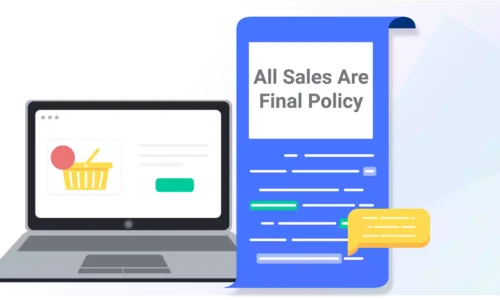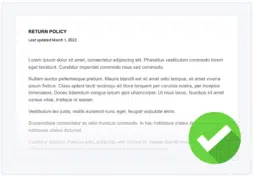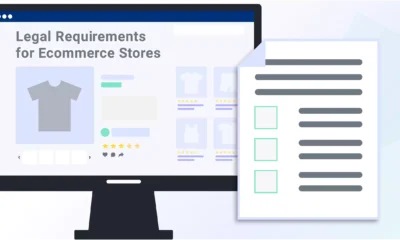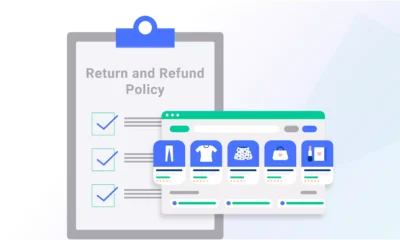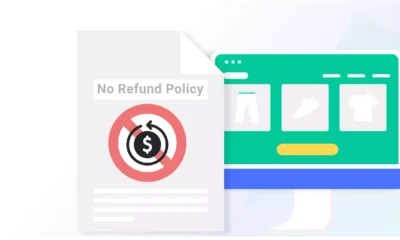Some businesses sell items that are difficult or unable to be returned — like perishable foods, delicates, large pieces of furniture, or customized and personalized goods.
In these cases, it may be in your best business interest to implement an all sales are final policy, which you should clearly communicate in your refund and return policy.
Below, I explain what an all sales final policy is, whether you can legally have one, and how to write an all sales are final policy that’s compliant and keeps customers properly informed.
How to Create an All Sales Are Final Policy
You can create an all sales final policy by using a return policy generator, a template, or writing one yourself.
Generate a Free Customized Refund Policy Using Termly
Here’s how you can use Termly’s generator to easily create a comprehensive return policy that outlines everything you need.
Step 1: Go to Termly’s refund policy generator.
Step 2: Answer our prompts and questions. In the “Exceptions” section of the generator, specify which items are not eligible for returns.
Fill in details about your return process and create additional clauses for your policy if needed.
Then go through all of the steps until you reach “Final Details.
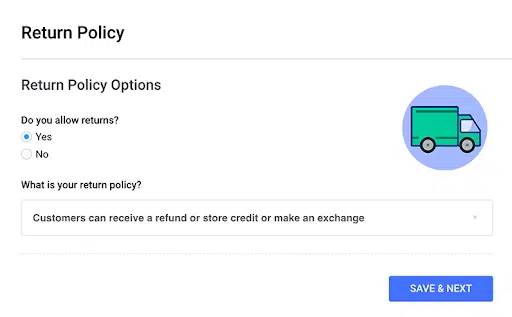
Step 3: Once you’ve filled in everything and you are satisfied with the preview, click “Publish.”
You will then be prompted to create an account on Termly so you can save and edit your return policy further.
Use a Return Policy Template
You can also customize our free return policy template and change all necessary sections to reflect your all sales final policy.
Carefully fill in all the blank sections with details about your business and remove any clauses that aren’t relevant to you.
You can then choose how you want to embed or download it.
Write One Yourself
If you choose to write an all sales are final policy yourself, I recommend following these writing and formatting tips:
- Use straightforward, simple language.
- Format it in a way that’s easy to read.
- Be very thorough, and don’t leave out any important details.
A well-written, clearly-displayed all sales final policy will make your policy easier to enforce and make the purchase experience more convenient for customers.
What Is an All Sales Are Final Policy?
An all sales are final policy is a statement notifying customers that there are no returns, refunds, or exchanges for specific items or services once purchased.
It’s similar to a no refund policy and is usually part of a business’s return policy or is hosted on a separate page.
An all sales final policy is commonly applied to:
- Clearance or sale items
- Customized or personalized items
- Non-returnable items
- Perishables
- Delicates
- Large, difficult-to-return items
Although final sale items are typically not eligible for returns, there may be exceptions, like accepting returns and issuing refunds for goods damaged during transit.
Some refund laws provide customers with remedies if their items are defective.
Additionally, if you want to notify buyers that items don’t come with warranties, labeling items as “final sale” isn’t enough — also, post a no warranty disclaimer saying that items are sold “as is.”
What Does “Final Sale” Mean?
When businesses use the term ‘final sale,’ it means an item is being sold as is and cannot be returned for a refund or exchange.
Typically, these items are sold at a heavily discounted rate to clear them from your inventory.
But non-returnable items can also be considered final sales, such as:
- Digital content: Digital products are often considered final sales as they can’t be returned once downloaded.
- Personalized items: These are difficult to resell because of their uniqueness.
- Toiletries: Toiletries and similar items are unsanitary to return.
- Single-use products: Single-use products sometimes cannot be returned due to their temporary nature.
- Swimwear and delicates: Swimwear and other delicates are considered unsanitary to return.
- Perishable items: Perishable items, like food, often cannot be returned for sanitation and safety reasons.
Because final sale items typically cannot be returned, exchanged, or refunded unless there are defects, you should explicitly list these goods in your all sales final policy.
Are All Sales Are Final Policies Legal?
All sales final policies are legal to implement in most regions, but there are some requirements and exceptions you must be aware of, so let’s look at some refund laws from different countries.
US
All sales final policies aren’t prohibited under any federal or state laws in the US.
Many state laws allow merchants to set their own return and refund policy as long as it’s clearly written and displayed.
In most cases, merchants don’t have to issue returns or refunds unless items are defective.
But California has stricter refund laws that mandate retailers with an all sales are final policy to display a conspicuous sign; otherwise, they must honor return and refund requests.
UK
All sales final policies are allowed under UK laws, but stores must allow returns or refunds if items are:
- Defective
- Don’t match their description
- Fail to perform as described
Customers who order goods online, by mail, or by telephone have the right to cancel their order for a limited time, no matter the return policy, even if the goods are not faulty.
Australia
Technically, Australian consumer laws allow merchants to have all sales are final policies, but you must still honor replacement or refund requests for defective products.
Where To Put an All Sales Are Final Policy
To enforce an all sales final policy, I recommend linking to it in the following specific places on your website:
- On checkout pages and payment screens
- In your terms and conditions
- In your website footer
- On any listings or pages of final sale items.
If you have a physical store, you may need to post readable signs declaring all sales are final in conspicuous places, as required by some refund laws, like near cash registers or item labels.
Posting the policy in multiple spots helps let users know about final sales before they choose to buy something so they can make a more informed decision.
All Sales Are Final Policy Examples
Now, I’ll walk you through some all sales final policy examples from different stores to help you get inspiration for your policy.
Wayfair
Some all sales final policies are very strict — for example, the furniture store Wayfair’s return policy lists non-returnable items without exceptions, as shown in the example below.
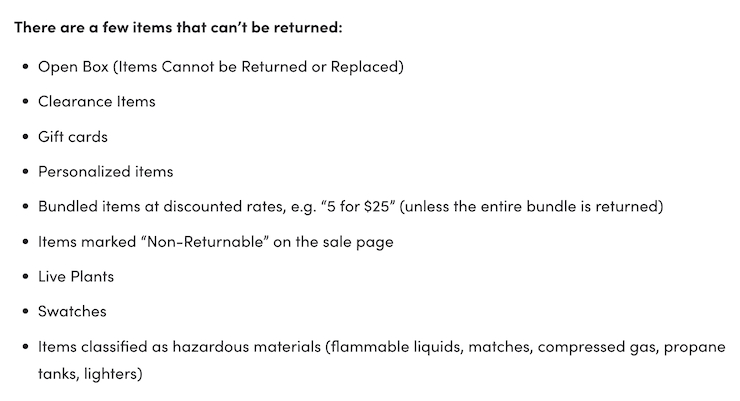
If you choose to have such a strict policy, be very clear about what items it applies to and list them all out, just like Wayfair.
Michael Kors
Another good example of an all sales final policy comes from the clothing designer Michael Kors’ return policy, which has a dedicated final sale section.
The screenshot below specifies that they don’t accept returns or exchanges for discounted products, swimwear, altered merchandise, and more.

As the example shows, personalized or altered items are also typically considered final sales, as they’ve been tailored for a customer.
If you sell products that cannot be returned due to safety or hygiene issues or customer personalization, categorize them as all sales final.
Summary
You’re now familiar with what an all sales are final policy is and what to include in one.
Remember to specify which items your all sales final policy applies to and the terms for returns or refunds.
For added protection, I suggest reviewing the consumer laws that apply to your business to ensure your all sales final policy is compliant.
You can easily make an all sales are final policy for your business using our refund and return policy generator or return policy template.
Reviewed by Masha Komnenic CIPP/E, CIPM, CIPT, FIP Director of Global Privacy


